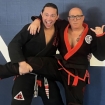"I've been listening to a lot of Satyricon at the moment. And Entombed, like old Entombed, back in the early Nineties," enthuses former UFC fighter Dan Hardy.
Hardy is at the gym in the U.K. when Revolver calls from across the pond to catch up with the metal-loving fighter. The Nottingham, England, native recently became a DJ on Gimme Radio, joining the likes of Megadeth's Dave Mustaine, Lamb of God's Randy Blythe, Amon Amarth's Johan Hegg, Orange Is the New Black actress and Brujeria backing vocalist Jessica Pimentel and more. His show, Full Reptile Radio, runs every Wednesday at 11 a.m. EST / 8 a.m. PST.
"They were looking to diversify the DJs that they had on staff," Hardy explains of the new gig. "I think people just kind of associated me with quite a strong taste in music [laughs], and there's a crossover with heavy music and MMA."
Indeed. After becoming the Cage Warriors Champion, "The Outlaw" joined the UFC in 2008. He was the promotion's rebel with a signature red mohawk, constantly adding tattoos, working with Earache Records and Deathwish Inc. and commonly walking out to Cock Sparrer's iconic punk anthem "England Belongs to Me." In 2010 he fought the rather invincible Georges St-Pierre for the welterweight title, and while the two went the distance, Hardy ultimately lost via unanimous decision in what became an infamous battle. ("Tap? … I don't know the meaning of tap.") Afterward, the fighter had several more bouts before being diagnosed in 2013 with Wolff-Parkinson-White syndrome (which causes a rapid heartbeat). Unable to be medically cleared to fight, Hardy stands at hiatus at 25-10-0, 1NC.
Since then, he's released a book, Part Reptile: UFC, MMA and Me, started the Full Reptile Collective shop that sells clothing, supplements, training equipment and coffee and is currently an analyst and color commentator for the UFC.
But back to the topic du jour — on Full Reptile Radio, Hardy plays music that appeals to his wide-ranging tastes, including anything from Madball and Nailbomb to Meshuggah and Pig Destroyer to Candiria, Faith No More, Tool, Incendiary and more. Here, we discuss how he got into heavy music, accessing the reptilian brain and, of course, his thoughts on "Face the Pain."

THERE'S A HUGE CROSSOVER BETWEEN THOSE WHO LOVE METAL, HARDCORE AND PUNK, AND THOSE WHO TRAIN OR PARTICIPATE IN MIXED MARTIAL ARTS. TO ME, IT FEELS LIKE YEARS AGO THERE USED TO BE MORE "METAL" PROFESSIONAL FIGHTERS. DO YOU AGREE?
DAN HARDY I think you're right. There has been a shift. I mean, the sport's growing and we've having far more mainstream people coming into it. When I was growing up, my fascination with martial arts was almost parallel with my passion for music. Every time I met somebody, they were — I don't want to necessarily say "heavy" all the time — but I think "alternative" is a good word. A lot of people getting into mixed martial arts early in the day were quite alternative people anyway. You know, a lot of people that fight professionally for money, they tend to sit just outside of society's norms. And I think you can say the same thing with the music industry. I used to go out to Rock City [a music venue in Nottingham]. They were all kind of the black sheep of their school or their family. The alternative people tend to gravitate toward alternative things. The other thing, as well, is obviously with fighting, there's a certain amount of anger and rage and aggression that comes with it, and that's parallel in the music, which always used to help me when I was training. I made sure I had the right music to kind of propel me through my harder sessions.
I THINK YOU HAVE AN INTERESTING PERSPECTIVE BECAUSE WHEN YOU WERE FIGHTING IN THE UFC, MIXED MARTIAL ARTS WASN'T LEGAL EVERYWHERE IN THE STATES, THERE WERE NO WOMEN'S DIVISIONS, THE SPORT WAS LOOKED DOWN UPON BY SOCIETY — IT WAS CONSIDERED TRASHY AND EVEN CALLED "HUMAN COCKFIGHTING." SO AT LEAST IT'S CHANGED FOR THE POSITIVE IN THOSE RESPECTS, BUT WHY AREN'T AS MANY "OUTSIDERS" ANYMORE?
Money was the big change. As soon as money came into it, we started to get people coming over to the sport that were athletes. In the early days, there was less money in the sport. It was much more about ego. It was much more personal achievement, about accolades, about the respect in your gym. That seems to me where more of a lot of the people that I was fighting back in the day were at. And now most of the people, it's much more of an agenda and "How do I get famous?" That wasn't the reason why I started fighting. It was purely because I loved fighting and I liked people to watch me fight [laughs], as egotistical as that may sound.
SO NOW YOU'RE HOSTING FULL REPTILE RADIO. FOR YOUR PLAYLISTS, HOW LONG DO YOU SPEND PUTTING THEM TOGETHER?
It varies. I've got several different ways that I can do it: I can dig out my old iPod, I can go through my old CDs, I have an obnoxious a record collection. Plus I've got loads of playlists that I already had made from training. That was probably the first 10 shows.
The one thing I am doing this year, which is different because if I'm traveling to, say, China, sometimes I'm not able to do the voice tracking for the shows. So I'm going to do some wild card playlists, which are pre-recorded that they can kind of throw in if I can't get to the mic. What I'm doing is the playlists are the elements of heavy metal. So I've got "Gimme Blood," "Gimme Fire," "Gimme War" — all those songs are around those particular subjects. I quite like to do that. I'm very much into patterns of being an analyst in mixed martial arts. I look at the patterns in people's movements.
SPEAKING OF TRAVELING AND WATCHING FIGHTERS' PATTERNS FOR COMMENTARY — CAN YOU EXPLAIN YOUR REPTILIAN PHILOSOPHY AMD HOW HAVE YOU TRANSITIONED SINCE "LEAVING" FIGHTING?
It's been a bit of a strange time to be honest because a lot of it — particularly stopping fighting — was not on my terms. I was planning on fighting for at least another 18 months. A lot of it was just forcing me to be adaptable. I've always been very analytical and I know that a lot of people watching me fight back in the day probably wouldn't have thought that because I was screaming at the camera and snarling and smiling when I got punched. I enjoyed that part of my life. I did. I very much miss it.
But that's an element of my character. That person that people used to see in the Octagon is maybe 10 percent of my character and I allowed that part of my character to really breathe when I was fighting. A lot of that is down to trying to get closer to the reptilian brain — accept a little ego, accept the overconfidence, being brash, being aggressive. It was quite towards the end of my career, my last couple of fights, where I really started to understand how my brain was functioning at different times. Right now, we're having a conversation and my prefrontal cortex is active — we're communicating, there's no fight-or-flight necessary.
If, say, I lost my job and I was concerned about cash flow or my family was sick, then you kick into the other part of the brain. The part operating that we can't really exercise very much at all anymore is the reptilian brain and that's what the Octagon offers. It's a very difficult part of the brain to access unless you grow up in a very turbulent environment or you're in a situation where your life is in danger and you need to keep yourself alive. But to access the reptilian brain in a sporting environment can be quite difficult. That's when you get people that say, "Oh, I need to get punched a couple of times to get switched on." It's been something that's common in interviews of combat sport athletes throughout history. I watch the patterns throughout the sport and who is close to the reptilian brain and who's still functioning in that old mammalian brain.
I'm fascinated with hand-to-hand combat sport history, the situations where people were forced to rely on the reptilian brain. In those moments I imagine those scenarios were very chaotic — weapons clashing against each other, the sound of boots on the ground. That low vibration, aggressive rumble does something to the brain. I think if it vibrates at the same frequency as the reptilian brain. I know it sounds a bit crazy, but I am a little bit crazy, as you know. But I feel like music kind of replicates that vibration. So if I'm struggling to get my brain switched on for training and I don't feel like it, if I put "Territory" on by Sepultura ... just thinking about it, my brain switches on in a different way. The idea of being able to manipulate that with music is amazing to me.
WE KNOW FROM SCIENTIFIC STUDY THAT HUMANS HAVE BEEN MAKING MUSIC FOREVER. THEY HAD LITERALLY LIFE-OR-DEATH SITUATIONS THE ENTIRE TIME, BUT THEY WERE ALSO CREATIVE PEOPLE.
A lot of the sound meditations that people do, it replicates vibration. Everyone knows ohm. It's the vibration of earth, that's the sounds the earth makes. Something that people don't know actually is the sound of the start of my Full Reptile Radio podcast is a low vibration. That's the sound of Jupiter. I just don't think we fully understand how important sound is to us. By having a wide music selection I can explore those different vibrations, especially if you get a good vocalist. I mentioned Sepultura earlier and Max Cavalera and Chino [Moreno] of the Deftones is another favorite of mine. There's a particular pitch in some people's voice and that feeling translates over to me and I'm able to put that into whatever I'm doing.
ABSOLUTELY. I THINK THAT'S WHY I'M MORE ATTRACTED TO HARDCORE BECAUSE OF HOW THE VOCALIST IS DELIVERING WHAT THEY'RE SAYING. I KNOW YOU'RE A HUGE HARDCORE FAN, AS WELL. WHAT WAS YOUR FIRST INTERACTION WITH THE GENRE?
It's difficult to say, to be honest. My parents were 17 when I was born, so had all their musical tastes. My dad was into a lot of punk and that went from mainstream — Sex Pistols, Clash — all the way to Crass. My mom was into the Beatles, the Doors, Fleetwood Mac, Blondie, so I have a lot of different sounds from her, as well. But it was actually when I started having guitar lessons, I think I was 11, this guy, I went to his house and he was teaching myself and my friend guitar lessons and his walls were covered in posters. His main band was Megadeth. He made a cassette tape and it had old stuff like Killing Is My Business…, So Far, So Good… So What! and a bit of Rust in Peace on it. I think this was around the time Countdown to Extinction came out. I listened to it and all of a sudden I was like, "What is this sound? It's making me feel a very different way that I have not experienced before." It made me so excited, aggressive, it made me want to go train. I mean, I had been training in martial arts for six years by then so I was very familiar with fighting.
I started buying Kerrang! and Metal Hammer and there were free CDs on the front a lot of the time. I mean, kids at school were into Blur so I wasn't able to share music with people at school very much. So I started buying loads of these magazines. I got into Earth Crisis, Biohazard, Sepultura, Pantera. That was my main thing because it was much cheaper to buy a magazine for two pounds 50, than to buy one album for 12 pounds. By the time I was 14, I was going to Rock City and a lot of people I was meeting were older than me so my group of friends were between 18 and 30. I would bump into the likes of Napalm Death, Pitchshifter, Earthtone9. It had such a good reputation for live shows that everybody came through town.
YOU MENTIONED PANTERA, AND FOR YOUR FIRST SHOW ON GIMME THE VERY FIRST SONG WAS PANTERA'S "DRAG THE WATERS." WAS THAT INTENTIONAL?
It was very specific. That was the song I used for my first two professional fights. I could pick my entrance music, which was incredibly important for me. So I'd done this whole visualization program all the way through training camp and "Drag the Waters" was the song that I'd chosen to walk out to. I wanted to do "5 Minutes Alone" because MMA rounds are five minutes, but the way "Drag the Waters" starts, it's so guttural and ferocious. So I did it for my first two fights, but unfortunately it was a horrible choice because I got myself in such a state of rage.
I would connect the sound of the music to that feeling. So as soon as I was standing backstage and I have all these nerves and anxiety and that music kicks in, it was like pssssshhh, rocket fuel. I mean, fortunately I was in good shape and able to step into the fight without running out of gas, but I was fighting a veteran and he could just take everything I could throw at him because I wasn't smart. I wasn't focused. I was completely animalistic. I lost control and it wasn't the state I needed to be in. It was a great lesson. I tried it for my next fight, and I won that fight, but same thing again, I was just so angry that I had to go a different direction after that.
YOU'RE MOST WELL KNOWN FOR WALKING OUT TO COCK SPARRER'S "ENGLAND BELONGS TO ME." MY UNDERSTANDING WAS ONE OF THE REASONS YOU CHOSE IT WAS TIED TO THE IDEA OF BRINGING THE U.K. A TITLE. BUT IT COULD HAVE BEEN MANY SONGS — WHY THAT ONE?
It's Cock Sparrer, which is a damn good reason. [Laughs] I needed something that would get the crowd lifted. There were a lot of guys that have been signed to the UFC before me. I was in Cage Warriors, I was the Cage Warriors champ. And the UFC came in and kind of scooped up a whole bunch of British fighters, some of them in my weight class, and I was ranked above all of them. So when that happened I felt a little bitter and they're parading around like they're the best fighters in the UFC out of the U.K. I knew that wasn't the case. So when I my signed my contract, I wanted to walk out and let them know I was here now. It was totally ego. I look back at it now and it's a bit silly. Again, I'm patriotic because I love this country, but I'm not patriotic in a way that I draw a line in the sand against anybody else. So I could lean on that patriotism and know that there was going to be a good fight in the arena and a lot of people could sing along to it even if they had not heard it before. It just worked out to be a great choice and Lorenzo Fertitta [former CEO of the UFC] loved it and Dana [White, current president of the UFC] liked it. Then, before my title fight, Cock Sparrer reached out to me and wanted to know if I wanted to re-record it with them.
FINAL QUESTION. THOUGHTS ON THE UFC THEME MUSIC, STEMM'S "FACE THE PAIN"?
[Sighs] Nostalgic. Pleasant because it's nostalgic, but ultimately in 2019, unnecessary. [Laughs] It's the nostalgia. It's like the voice of Bruce Buffer — it reminds them of the UFC. There was another song that use to remind me of old UFC … that song "Singled Out" by Diecast. Do you remember that?
YEAHHH, HAVEN'T THOUGHT ABOUT THAT ONE IN A BIT.
But it's Nineties MMA and the whole Tapout T-shirts with skulls and wings! Yeah … I'm glad we're moving out of those days now.








